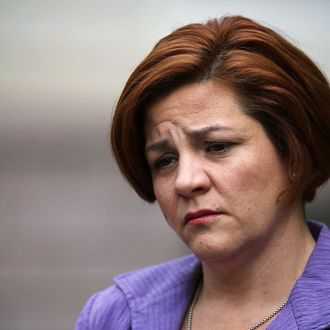
City Council speaker seems like a great gig for a politician aspiring to higher office. It’s the second most powerful citywide elected position, perfect for building name recognition, shaping major policy issues, and raising campaign money. But the past week has been a reminder of the liabilities that also come with the job. First came a brushback pitch from one of Christine Quinn’s supposed teammates, Gloria Steinem. The feminist icon said she had endorsed Quinn for mayor in exchange for a promise that the council speaker would allow a vote on a bill requiring businesses to give their employees paid sick leave — and now Steinem was threatening to pull her support because Quinn hasn’t delivered. That same day, the Post ran a small item culled from the most recent campaign finance filings, saying that Quinn had taken $17,000 connected to the developers of Hudson Yards at the same time she was negotiating an exemption from a new “living wage” law.
The speaker’s job, for all its benefits, comes with a built-in political problem: Dealing with high-profile issues is bound to antagonize people who disagree with your actions. Quinn’s 2013 opponents will beat her up on everything from her role in Mayor Bloomberg’s term limits extension to her support for building a garbage transfer station on East 91st Street. Quinn, though, often makes it tougher on herself with non-decisions, asking for repeated revisions and modifications to bills rather than declaring her position at the outset. Her allies say this is what the head of a legislature is supposed to do — bring together competing interests to hammer out the best compromise on subjects where there are no easy answers. Her detractors see stalling and the finessing of anything that might damage her mayoral hopes.
This week Scott Stringer, the Manhattan borough president and a 2013 rival of Quinn’s, announced his opposition to the proposed expansion of Chelsea Market, a contentious issue in the council district Quinn represents. Stringer’s tactical maneuver is pretty obvious: He’s bidding for the votes of anti-expansion activists. But he’s also trying to turn up the pressure on Quinn, who hasn’t taken sides, saying she’s trying to satisfy both the neighborhood opponents and the real estate companies that are pushing for the project — some of whom have been donors to her campaign.
“A year before the mayor’s races in 2001 and 2005, who was considered the Democratic favorite? The incumbent city council speaker,” says a Democratic strategist unaffiliated with any of the current contenders. “But Peter Vallone and Gifford Miller lost those primaries, in part because when you’re speaker you make as many enemies as friends.” True, but Quinn is a better politician and campaigner than either of those guys were, and she’s still the 2013 mayoral frontrunner — ahead in the polls and at the bank. To win, though, she’ll need to show that her record as speaker demonstrates more leadership than risk avoidance.





























